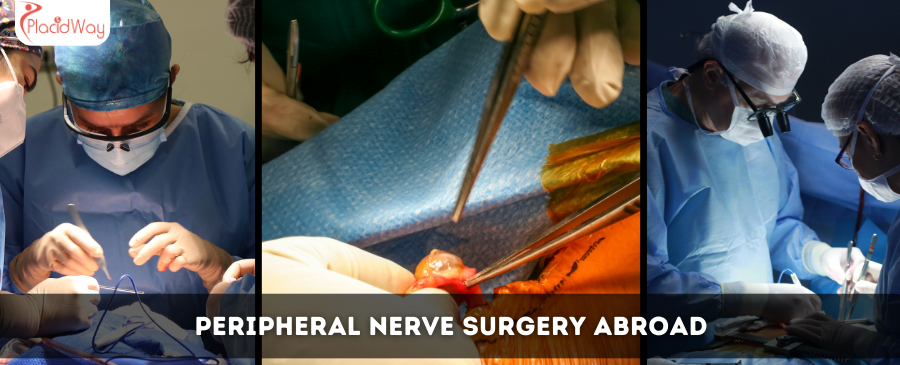
Finding Relief: Your Guide to Peripheral Nerve Surgery & Treatment Abroad
Living with persistent nerve pain, numbness, tingling, or muscle weakness can be debilitating, impacting every aspect of your life. When conservative treatments fall short, Peripheral Nerve Surgery can offer a beacon of hope. This specialized field of surgery focuses on repairing, decompressing, or reconstructing nerves outside of the brain and spinal cord, known as peripheral nerves. These nerves are crucial for sensing, movement, and transmitting signals between your brain and the rest of your body.
From a simple pinched nerve like carpal tunnel syndrome to complex traumatic injuries or nerve tumors, peripheral nerve damage can stem from various causes. The good news is that advancements in microsurgery and neurosurgery have made it possible to address many of these conditions, often leading to significant recovery of function and relief from chronic pain. If you've been experiencing symptoms that suggest nerve involvement, such as persistent tingling in your fingers, a sudden drop in your foot, or burning pain that won't subside, understanding your treatment options, including the potential for surgical intervention, is a vital first step.
For many individuals, seeking high-quality, affordable medical care means looking beyond their borders. Medical tourism for peripheral nerve surgery is increasingly popular, offering access to world-class specialists, advanced technologies, and often substantial cost savings. This guide will walk you through everything you need to know about peripheral nerve surgery, from symptoms and causes to recovery, costs, and why exploring options abroad might be your best path to regaining your health and comfort.
What are the common symptoms of peripheral nerve damage that might require surgery?
Recognizing the signs of peripheral nerve damage is crucial for timely diagnosis and treatment. The symptoms can vary widely depending on which nerves are affected, the extent of the damage, and the underlying cause. However, some common indicators often prompt individuals to seek medical attention:
- Numbness or Reduced Sensation: A common complaint, often described as a "pins and needles" feeling that can progress to complete numbness. This can make simple tasks like buttoning a shirt or walking difficult.
- Tingling and Burning Sensations: Known as paresthesia, these uncomfortable sensations can range from a mild prickling to intense burning pain. Patients often search for "tingling hands treatment" or "burning feet relief."
- Sharp, Stabbing, or Electric-Shock-like Pain: Neuropathic pain can be excruciating and unpredictable, often flaring up without warning. This is a key symptom prompting searches for "nerve pain relief surgery."
- Muscle Weakness or Paralysis: Difficulty moving a limb, dropping objects, or even complete paralysis can occur if motor nerves are severely damaged. Patients might experience "foot drop" or weakness in the grip.
- Loss of Coordination and Balance: Damage to sensory nerves can impair proprioception (your sense of body position), leading to stumbling or difficulty with fine motor skills.
- Increased Sensitivity to Touch: Even light touch, like clothing against the skin, can be painful (allodynia).
- Muscle Wasting: Over time, if nerves are unable to stimulate muscles, they can begin to shrink.
- Autonomic Symptoms: Less common, but nerve damage can affect involuntary bodily functions, leading to issues with digestion, blood pressure, sweating, or bladder control.
If you experience any of these symptoms persistently, especially if they are worsening or interfering with your daily life, it's important to consult a healthcare professional. Early diagnosis can significantly improve outcomes for "nerve injury treatment."
What causes peripheral nerve damage, and am I at risk?
Understanding the root cause of nerve damage is paramount for effective treatment. Peripheral nerves are delicate and susceptible to injury from various sources:
- Trauma: This is a common cause, including accidents, falls, sports injuries, knife wounds, or gunshot wounds that directly sever, crush, or stretch nerves. Searching for "nerve repair after injury" is common for this cause.
- Compression (Entrapment Neuropathy): Nerves can become "pinched" or compressed by surrounding tissues (bones, ligaments, tendons) as they pass through narrow spaces. Examples include:
- Carpal Tunnel Syndrome: Median nerve compression in the wrist, leading to numbness and tingling in the hand.
- Cubital Tunnel Syndrome: Ulnar nerve compression at the elbow.
- Peroneal Nerve Entrapment: Causes foot drop.
- Sciatica: Sciatic nerve compression in the lower back/buttocks.
- Tumors: Both benign and malignant growths can directly compress or infiltrate nerves.
- Systemic Diseases: Conditions that affect the entire body can lead to nerve damage.
- Diabetes: One of the most common causes of peripheral neuropathy worldwide, often affecting nerves in the feet and hands.
- Autoimmune Diseases: Conditions like lupus, rheumatoid arthritis, or Guillain-Barré syndrome can attack nerve tissue.
- Kidney or Liver Disease: Can lead to a buildup of toxins that damage nerves.
- Infections: Viral (e.g., Shingles, HIV) or bacterial infections can directly damage nerves.
- Toxins and Alcohol Abuse: Exposure to certain chemicals, heavy metals, or chronic alcoholism can be neurotoxic.
- Nutritional Deficiencies: Lack of certain vitamins (especially B vitamins) can impair nerve health.
- Medical Procedures: In rare cases, surgery or injections can inadvertently cause nerve damage.
Are you at risk? If you have diabetes, a history of trauma, engage in repetitive motions, have autoimmune conditions, or suffer from chronic kidney/liver disease, your risk of peripheral nerve damage may be higher. Discussing your lifestyle and medical history with a doctor is essential to determine your individual risk profile for "nerve damage causes."
What types of Peripheral Nerve Surgery are available, and how do they work?
Peripheral nerve surgery encompasses a range of sophisticated techniques, each tailored to the specific type and extent of nerve damage. The goal is always to either decompress, repair, or reconstruct the damaged nerve to restore its ability to transmit signals. Common procedures include:
- Nerve Decompression (Neurolysis):
- How it works: This is typically performed for entrapment neuropathies where a nerve is being compressed by surrounding tissue. The surgeon identifies the point of compression and surgically releases the pressure by cutting ligaments, removing scar tissue, or freeing the nerve from adhesions.
- Example: Carpal tunnel release surgery is a classic example, where a ligament is cut to alleviate pressure on the median nerve in the wrist.
- Direct Nerve Repair (Neurorrhaphy):
- How it works: If a nerve has been cleanly severed (e.g., from a sharp cut), the surgeon carefully realigns the two ends of the nerve and stitches them together using very fine sutures under a microscope. This allows the nerve fibers to grow across the gap.
- Example: Repairing a cut nerve in the arm after an accident.
- Nerve Grafting:
- How it works: When there's a significant gap between severed nerve ends that cannot be directly rejoined, a segment of a less critical sensory nerve (called a donor nerve, often from the leg or forearm) is harvested and used to bridge the gap. The nerve fibers then grow through the graft.
- Example: Repairing a large nerve deficit in the leg after a complex injury.
- Nerve Transfer:
- How it works: In cases where the injured nerve is severely damaged or too far from its target muscle to regenerate effectively, a healthy, functioning nerve that supplies a less critical muscle is surgically rerouted and connected to the damaged nerve's distal end. This "borrows" nerve supply to restore function to a more important muscle.
- Example: Using a nerve from a functioning muscle to restore elbow flexion after a brachial plexus injury.
- Tendon Transfers:
- How it works: While not directly a nerve surgery, if nerve recovery is unlikely or incomplete, tendon transfers can sometimes be performed to reroute healthy muscles and tendons to take over the function of paralyzed muscles, restoring movement.
The choice of procedure depends on factors like the type of injury, the specific nerve involved, the time since injury, and the patient's overall health. Advanced imaging and electrodiagnostic tests help surgeons plan the most effective "nerve surgery procedure."
Who is eligible for Peripheral Nerve Surgery, and is it right for me?
Deciding if peripheral nerve surgery is the right step for you involves a comprehensive evaluation by a specialist, usually a neurologist or neurosurgeon. Several factors contribute to eligibility:
- Clear Diagnosis of Nerve Involvement: This is paramount. Imaging studies (MRI, ultrasound), nerve conduction studies (NCS), and electromyography (EMG) are used to pinpoint the exact location and extent of nerve damage.
- Symptoms Impacting Quality of Life: Surgery is typically considered when symptoms like severe pain, significant numbness, or muscle weakness are debilitating and interfere with daily activities, work, or sleep. Patients often seek "nerve surgery eligibility criteria."
- Failure of Conservative Treatments: Before considering surgery, doctors usually recommend non-surgical approaches such as physical therapy, anti-inflammatory medications, pain management injections, bracing, or lifestyle modifications. If these methods provide insufficient or no relief, surgery becomes a viable option.
- Type and Severity of Nerve Injury:
- Compression: Conditions like severe carpal tunnel syndrome that don't respond to conservative care are prime candidates for decompression.
- Traumatic Injuries: If a nerve is partially or completely severed, especially recent injuries, prompt surgical repair offers the best chance for recovery.
- Tumors: Surgical removal of nerve-compressing tumors is often necessary.
- Overall Health Status: Patients must be healthy enough to undergo general anesthesia and recover from surgery. Underlying health conditions (e.g., uncontrolled diabetes, severe heart disease) might increase risks, requiring careful pre-operative assessment.
- Realistic Expectations: It's important for patients to understand that nerve regeneration is a slow process, and complete recovery is not always guaranteed. The surgeon will discuss potential outcomes based on the specific injury.
If you're wondering, "Is peripheral nerve surgery right for me?", a detailed consultation with a nerve specialist is your best next step. They will review your medical history, perform a physical examination, and interpret diagnostic tests to provide a personalized recommendation.
What is the recovery time and what can I expect after peripheral nerve surgery?
Recovery after peripheral nerve surgery is a journey, not a destination. It's often longer and more involved than recovery from other types of surgery because nerves regenerate very slowly – typically about one millimeter per day. This means it can take months or even years for significant improvement, especially after nerve grafting or transfer. What to expect:
- Immediate Post-Operative Period (Days to Weeks):
- Pain Management: You will experience some pain at the surgical site, managed with prescribed medications.
- Immobilization: The affected limb may be splinted or casted to protect the repair, especially after nerve repair or graft.
- Wound Care: Instructions for keeping the surgical incision clean and dry to prevent infection.
- Early Recovery Phase (Weeks to Months):
- Physical and Occupational Therapy: This is critical. Therapists will guide you through exercises to maintain joint mobility, prevent stiffness, and gradually strengthen muscles. They will also help retrain your brain to interpret new sensory signals as nerves regenerate. Expect "nerve rehabilitation exercises."
- Sensory Retraining: For sensory nerve repairs, therapists will use techniques to re-educate your brain about touch, temperature, and pressure.
- Gradual Return to Activity: You'll slowly increase your activity level, avoiding strenuous movements or heavy lifting as instructed by your surgeon and therapist.
- Long-Term Recovery (Months to Years):
- Nerve Regeneration: This is the slowest part. You might notice a tingling or "pins and needles" sensation advancing down the limb as nerves grow.
- Functional Improvement: Gradual return of sensation and muscle strength will occur. The extent of recovery varies greatly depending on the type of injury, patient age, and commitment to therapy. Complete recovery isn't always possible, but significant improvement is often achieved.
- Patience is Key: It's vital to remain patient and diligent with your therapy, celebrating small victories along the way.
Your surgeon will provide a personalized "peripheral nerve surgery recovery timeline" and detailed instructions based on your specific procedure. Regular follow-up appointments will monitor your progress.
What are the potential risks and side effects of peripheral nerve surgery?
As with any surgical procedure, peripheral nerve surgery carries certain risks and potential side effects. While serious complications are rare, it's important to be aware of them to make an informed decision:
- General Surgical Risks:
- Infection: Any surgical incision carries a risk of infection, managed with antibiotics.
- Bleeding: Excessive bleeding during or after surgery.
- Anesthesia Risks: Reactions to anesthesia, though rare, can occur.
- Blood Clots: Deep vein thrombosis (DVT) is a risk with any surgery, especially in the lower extremities.
- Specific Peripheral Nerve Surgery Risks:
- Incomplete Nerve Recovery or No Improvement: Despite successful surgery, the nerve may not fully regenerate, or symptoms might persist. This is a significant concern for many patients searching for "risks of nerve repair surgery."
- Persistent Pain or Worsening Symptoms: In some cases, nerve pain may not resolve or could even intensify.
- Nerve Damage: Though surgeons take extreme care, there's a small risk of incidental damage to healthy nerves during the procedure.
- Scarring: Excessive scar tissue can form around the nerve, potentially leading to renewed compression or tethering, sometimes requiring further surgery.
- Neuroma Formation: A painful bundle of nerve endings can form at the site of a nerve injury or repair.
- Weakness or Numbness in Donor Site (for nerve grafts): If a nerve graft is used, the donor site (e.g., the calf) will have permanent numbness.
- Complex Regional Pain Syndrome (CRPS): A rare but severe chronic pain condition that can develop after nerve injury or surgery.
Your surgeon will thoroughly discuss these "peripheral nerve surgery side effects" and risks with you, weighing them against the potential benefits of the procedure for your specific condition.
How much does Peripheral Nerve Surgery cost worldwide, and where can I find affordable options?
The cost of peripheral nerve surgery can be a major factor in treatment decisions, particularly for those without comprehensive insurance coverage or facing high deductibles. Prices vary dramatically depending on the country, the specific procedure (e.g., simple decompression vs. complex nerve graft), the surgeon's fees, hospital stay, and post-operative care. This is a primary driver for people researching "peripheral nerve surgery cost abroad."
Estimated Cost Comparison for Peripheral Nerve Surgery (USD)
| Country/Region | Estimated Cost Range (USD) | Notes |
|---|---|---|
| United States | $20,000 - $60,000+ | Highly variable based on state, facility, surgeon. High insurance co-pays/deductibles. |
| Western Europe (UK, Germany, France) | $15,000 - $45,000+ | High quality, but can be expensive without national healthcare coverage. |
| India | $5,000 - $15,000 | Leading destination for medical tourism, excellent quality, highly competitive prices. |
| Thailand | $6,000 - $18,000 | Renowned for modern facilities, English-speaking staff, and patient experience. |
| Turkey | $7,000 - $20,000 | Growing medical tourism hub with advanced hospitals and skilled surgeons. |
| Mexico | $7,000 - $18,000 | Convenient for North American patients, good quality at lower costs. |
| Costa Rica | $8,000 - $20,000 | Known for high-quality private healthcare and appealing recovery environment. |
For individuals seeking "affordable nerve surgery options," medical tourism offers a compelling solution. Many international hospitals provide comprehensive packages that include the surgery, hospital stay, medication, and sometimes even local transportation and accommodation, offering transparent pricing that is often a fraction of Western costs.
Why consider traveling abroad for Peripheral Nerve Surgery?
The decision to travel abroad for a medical procedure is significant, but for many, the benefits far outweigh the logistical considerations. Here's why "medical tourism for nerve surgery" is gaining popularity:
- Significant Cost Savings: As seen in the table above, the most compelling reason is often the dramatic difference in cost. You can often receive the same or even higher quality of care for a fraction of the price found in the US or Western Europe. This includes surgical fees, hospital stay, and sometimes even pre/post-operative appointments.
- Access to Specialized Expertise: Some countries are renowned for their centers of excellence in neurosurgery and microsurgery. Traveling abroad can provide access to world-leading surgeons who specialize exclusively in peripheral nerve conditions and perform a high volume of these complex procedures.
- Reduced Waiting Times: In many countries with public healthcare systems, waiting lists for non-emergency surgeries can be long. Traveling abroad often means quicker access to treatment, which can be crucial for nerve injuries where timely intervention can impact outcomes.
- Advanced Technology and Facilities: Many international hospitals catering to medical tourists boast state-of-the-art equipment, modern operating theaters, and luxurious recovery suites comparable to, or even exceeding, those in Western countries.
- Privacy and Anonymity: For some, the opportunity to undergo a medical procedure away from home offers a sense of privacy and discretion.
- Combined with a Vacation/Recovery: Depending on the recovery timeline, some patients choose destinations that also offer a pleasant environment for post-operative rest and recuperation, effectively combining treatment with a peaceful retreat.
Choosing a reputable medical tourism facilitator like PlacidWay can streamline the process, connecting you with accredited clinics and experienced surgeons who are experts in "peripheral nerve treatment abroad."
Which countries offer the best value and quality for peripheral nerve surgery?
When selecting a destination for peripheral nerve surgery abroad, it's crucial to balance cost-effectiveness with high standards of care. Several countries have emerged as leaders in medical tourism, offering excellent value and quality:
- India: Often considered the "pharmacy of the world" and a major medical tourism hub. India offers highly skilled neurosurgeons, many trained in Western countries, with advanced hospitals and significantly lower costs. Patient care is often holistic and compassionate. Many search for "nerve repair surgery India."
- Thailand: Known for its luxurious private hospitals, warm hospitality, and cutting-edge medical technology. Thailand excels in providing a comfortable patient experience alongside top-tier medical care.
- Turkey: A rapidly growing medical tourism destination with modern hospitals, particularly strong in neurosurgery and reconstructive procedures. Its strategic location makes it accessible from both Europe and the Middle East.
- Mexico: A popular choice for North American patients due to its proximity and often more relaxed visa requirements. Mexican hospitals, especially near the border and in major cities, offer high-quality care with internationally accredited facilities.
- Costa Rica: Offers high-quality private medical care in a beautiful, serene environment, ideal for recovery. Its healthcare system is well-regarded, attracting patients seeking "nerve surgery Costa Rica."
- South Korea: While potentially higher in cost than some other Asian options, South Korea is globally recognized for its technological advancements in medicine, particularly in complex surgeries and diagnostics.
When evaluating "best countries for nerve surgery," look for countries with:
- Internationally accredited hospitals (e.g., JCI accreditation).
- Surgeons with extensive experience and specialty in peripheral nerve surgery.
- Advanced medical technology and infrastructure.
- Good communication infrastructure, often with English-speaking staff.
- Positive patient testimonials and outcomes.
How can I ensure safety and quality when choosing a clinic for nerve surgery abroad?
Patient safety and the quality of care should always be your top priorities when considering medical treatment abroad. Diligence in research and planning is key:
- Accreditation Matters: Look for hospitals that have international accreditations, such as those from the Joint Commission International (JCI). JCI accreditation signifies that a hospital meets rigorous international standards for patient safety and quality of care.
- Verify Surgeon Credentials and Experience: Research your surgeon thoroughly. Look for board certifications, specialized training in neurosurgery or peripheral nerve surgery, years of experience, and the volume of nerve surgeries they perform. Many reputable surgeons will have profiles online or on hospital websites. Don't hesitate to ask for their CV or information on their success rates.
- Review Patient Testimonials and Outcomes: Seek out genuine patient reviews and success stories. Websites like PlacidWay often feature patient experiences. While individual results vary, a pattern of positive outcomes is a good indicator.
- Clear Communication: Ensure there's clear and consistent communication with the clinic and surgical team. Language barriers can be a concern, so confirm that interpreters or English-speaking staff will be readily available throughout your journey.
- Comprehensive Treatment Plan and Follow-up: Request a detailed treatment plan upfront, including pre-operative assessments, the surgical procedure, expected hospital stay, and post-operative care. Understand how follow-up care will be managed, especially after you return home.
- Understand All Costs: Get a clear, all-inclusive quote to avoid hidden fees. This should cover consultation, surgery, anesthesia, hospital stay, medications, and any necessary post-operative supplies or therapy.
- Utilize a Reputable Medical Tourism Facilitator: Companies like PlacidWay specialize in connecting patients with vetted, high-quality international hospitals and clinics. They can assist with everything from finding the right specialist and getting quotes to travel arrangements, accommodation, and interpreter services, significantly reducing the stress and uncertainty of medical travel. They act as your advocate, helping you navigate the complexities of "safe nerve surgery abroad."
By taking these steps, you can confidently choose a facility that prioritizes your safety and provides excellent care for your peripheral nerve surgery, ensuring a smoother journey towards recovery.
Take the Next Step with PlacidWay
Ready to explore treatment options abroad? Discover top clinics, compare prices, and get a free quote tailored to your needs with PlacidWay.
Best Neurology Treatment Center | Cheap Neurology Treatment Packages



.jpeg)






Share this listing